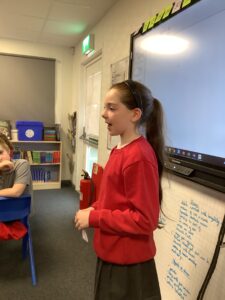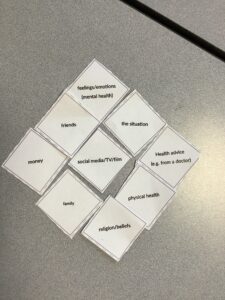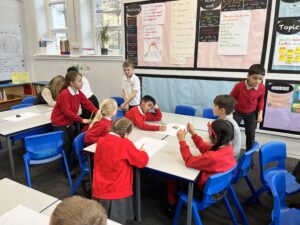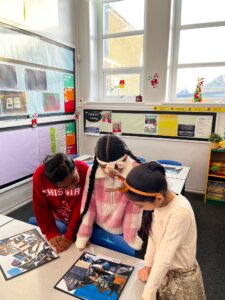Reading: Performing Poems
The children have been performing the poem ‘I wandered lonely as a cloud’ by William Wordsworth to their peers. In this homework review, the children practised their oracy skills of:
- eye contact,
- voice projection,
- fluency and pace,
- and tonal variation.





The outcome was fantastic!
Science: Our Solar System
In Science this week, we learnt about our solar system. We sorted fact cards into four different categories (planets, sun, moon or Earth). Then, we carried out research using secondary sources (a form of scientific enquiry).
This learning linked to our Computing and Living and Learning curriculum as we discussed the reliability and accuracy of information from the fact cards and the websites which we were looking at.

In addition, we created solar system posters; have a look at our fabulous work:



Finally, we made mnemonics to remember the order in which the planets orbit the sun.
Help at home: Come up with a new mnemonic to remember the order of our solar system. Here is an example:
Mercury My
Venus Very
Earth Epic
Mars Marvellous
Jupiter Jumper
Saturn Suits
Uranus Unqiue
Neptune Neil
Or why not watch the ‘we are planets’ song.
We are readers!
On Thursday afternoon Year 1 decided to change around their book corner. Mr McGriffiths spread out lots of new and interesting books on our tables and we were able to explore all the books. Everyone was very excited to look through and read these different books, which ranged from superhero potatoes to snow dragons via mischievous cats! In the end, we had to choose just one book to go into the book corner. It was very difficult to choose but we can’t wait to share our choice with our friends!



I was very proud of how enthusiastic all the children were when exploring and reading the books and I am very excited to get reading these books to the whole class!
Help at home: make sure you are reading your library books with your children every week as well as enjoying reading books to and with them. Don’t forget to write in your child’s reading record ever week when you have read their e-book.
Living and Learning: I know what a drug is.
Over the next couple of weeks in our Living and Learning sessions, we will be focusing on “Being Safe”. This week in Living and Learning, we discussed what a drug is and what might influence a person to take/not take them.
We learnt that a drug is: ‘a substance people take to change the way they feel, think or behave.’
We also talked about the term ‘drugs’ and how it refers to all drugs:
• all illegal drugs,
• all legal drugs, including alcohol, tobacco and volatile substances (those giving off a gas which can be inhaled),
• all over-the-counter and prescription medicines.
In small groups, the children created diamond nines of what they thought would be the biggest influence for taking/not taking drugs. Here is an example:

The children also gave reasons for their choices: “feelings/emotions might be the biggest influence as people might think it helps to relieve stress” and “family would not influence you to take them because they love you and wouldn’t want to harm you”.
Science rocks!
The first week back after Christmas has been a week of starting new topics and units. This includes our new Science topic – Rocks, soils and fossils!
Our first week began with the question – How are rocks different? We made careful observations of 12 different rocks and thought about what made them special.
This included things such as;
- Colour – is it one solid colour or does it have mixed colours?
- Texture – is it smooth, rough or both?
- Crystals – does it shine or sparkle?
- Weight – is it heavy or light?
- Layers – does it have stripes or clear layers?
Here are some of the class making their observations:


We then sorted a selection of the rocks into a Venn Diagram. The children had the choice of which features to sort the rocks by.
The class loved the lesson and already had fantastic knowledge in identifying the names of some of the rocks. One person remembered that one of the rocks (Basalt rock) is in the Earth’s Crust! This was from our first Topic lesson about the Earth.
Help at home by seeing if your child can identify any of these rocks based on their appearance!
The ‘Big Brain’ Art Gallery!
This morning, Year 3 and 4 hosted their first art gallery where they were able to showcase all the amazing art they have produced this half term.
We displayed all the pieces across the two classrooms and gave the children the opportunity to look around and comment on their classmates artwork.




A fantastic end to a fantastic half term!
All of the Year 3/4 team wish you a Merry Christmas and happy and healthy holiday.
See you in the New Year!
Living and Learning: mental health
Over the past three weeks, we have been discussing mental health: why it is important and how to look after it. We spoke about mental health being “about our feelings, our thinking, our emotions and our moods – things you can’t see, but affect our lives in lots of ways”.
We talked about how sometimes big emotions (strong emotions that stay for a long time and can stop us from doing what we want to do in our lives) can become very overwhelming but there are strategies to help us. The children talked about taking deep breaths; thinking of happy memories; taking part in something they love or completing a self-care activity.
Help at home: discuss which self-care activities your child might use to help deal with their emotions.




09 December 2022
This week’s Talk Time relates to our Science learning. Each class has been finding out about one or two scientists as part of their Science lessons.
I can show off my knowledge of different scientists.
Year 1/2: John Dunlop
Year 3/4: Jane Goodall
Year 5/6: Carl Linnaeus and Sarah Fowler
Have a chat with someone at home about the scientist that you have been learning about in your Science sessions. Some things to consider when talking about a scientist is:
- who they are
- what they did
- why their work was important
- whether their work has an impact on life today
Challenge: Do you know of any other scientists? Can you talk about their work and say how it has impacted on life today?
World Cup Geography
We’ve had a topical challenge this week relating to the World Cup. Our challenge was to identify the time zones of the different football teams in comparison to GMT (Greenwich Mean Time).



If you’ve ever been abroad, have friends or family who live abroad; why not identify which time zones they are in.
Certificates
The children are always excited and proud to get their Lexia and Numbots certificates on a Tuesday.
Can you believe we’ve had 87 Numbots certificates and 73 Lexia certificates so far in Year 2!
This is fantastic learning – well done, Year 2!